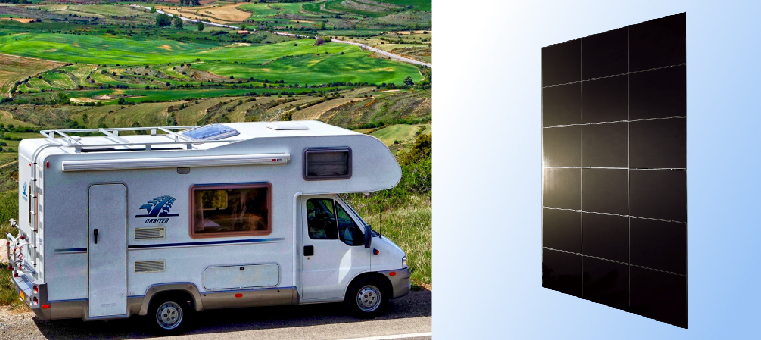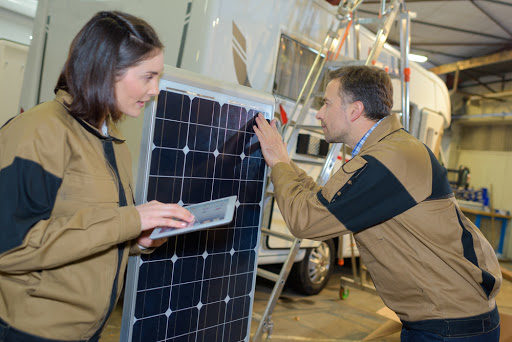




Hard day at the office? Going through a break-up? Visions of packing a bag and disappearing into the great American landscape are quite appealing. Yes, we all have dreams of going off the grid sometimes. The more serious among us really make a plan to unplug and explore the world. Whether you’re looking for an unconventional way to spend your retirement or the means to explore the world each summer, RV life might be the answer.
But what happens when you hit a roadblock, like the need to pull into a campsite every night to power up your generator or plug into an outlet? Camping with solar panels is the answer. Solar creates endless opportunities and lets you truly disconnect from the grid. When you don’t require a place to plug in you can make a temporary home anywhere under the sun. Solar means energy independence. Let’s look at what it takes to camp with solar panels and why being a self-sufficient camper is an incredible experience.
The short answer is, of course, “yes.” Solar panels can be installed on top of an RV or portable camper. Just as PV panels can power a home, they can supply your RV’s batteries with a reliable source of energy. Solar panels often replace generators for electrical needs on the road, and they afford even more freedom than their predecessors. With solar panels on your campervan or RV, you are free to explore untethered. Stops for gas are the only thing between you and unending, off-the-grid adventures. All you have to do is search blogs by people living the RV nomad life to see how many folks are making the leap to solar for self-sufficiency.

There are four main components needed to install and use solar on a camper or RV. Together, these components collect energy from the sun, regulate it on the way to storage, store it in battery form, and then convert it to the proper format for use inside your camper or RV. Whether you buy a complete kit or purchase parts separately, every camper solar system requires:
The amount of energy that can be generated with a RV solar system is literally infinite -- or, at least, it is for the life of your solar panels. Your panels are constantly absorbing energy from UV rays, even on a cloudy day. The question of how much you actually need and can store at once.
The average RV consumes between 75 and 150 amp-hours of energy each day, so three to six 100-watt panels will ensure you have enough energy to power your camper every day. If you have a lot of large appliances or you want the potential to grow your energy use in time, you may want to create a custom system with even more capacity. To figure out exactly how much energy you should aim for, use the formula Watts = Volts x Amps (W = V x A). Calculate the amps you use by dividing amp-hours by the number of hours you’ll use your appliances. For volts, use the voltage of RV solar panels, which is typically 18.
Once you know the watts required to power your camper you can purchase solar panels accordingly. Remember: increasing the wattage of your solar panels is only helpful if you also increase the amount of battery storage in your vehicle as well. If you have 800 watts of solar potential but only one battery -- you’ll end up with a lot of wasted energy.
Even when you use a formula to calculate how many watts of solar you require, the possibility always remains that you could run out of energy if you don’t plan well. Learning which systems and appliances zap energy the fastest will help prevent you from going dark. While it’s always a good idea to have a backup generator on hand if you are diligent about understanding energy use you may not need it. Plan your energy use with the following facts in mind:
When in doubt, you can always measure the usage manually to see how much your appliances and electronics use. The process for measuring depends on the size of the device in question. For a large appliance, you can use a clamp-on meter on your battery cables. Test the amps being used before turning the appliance on, then re-test once you start running the appliance. The difference will tell you how much strain your appliance is putting on the system.
For smaller devices, such as a radio or blender, you can leverage a usage monitor that plugs into an AC outlet. Once you plug your device into the monitor you’ll get a digital reading of its amp use.
Solar panels are a powerful tool for freedom from the grid, but you want to get it right. Many RV owners purchase solar components and install the system on their own, but it never hurts to get input from a professional. A solar team can evaluate how many batteries you need, for instance, in order to maximize the potential of your new solar panels. Remember that it’s not just about bolting your new panels to the top of your camper: You will also need to properly wire the panels to the convert and on to the batteries. In most cases, it makes sense to seek outside help for installing a solar energy system on a camper or RV.
Are you ready for life on the open road? Generators and campsites with electrical outlets may be enough for weekend warriors, but when you’re serious about going off the grid solar is the only way to go. Solar panels translate to total energy freedom and exponentially increase the possibilities for where you can travel. If you have questions about solar for your home or camper, contact Semper Solaris today for more information. We can customize a solar plan for your needs, and you’ll be supporting a veteran-owned business that puts customers first!